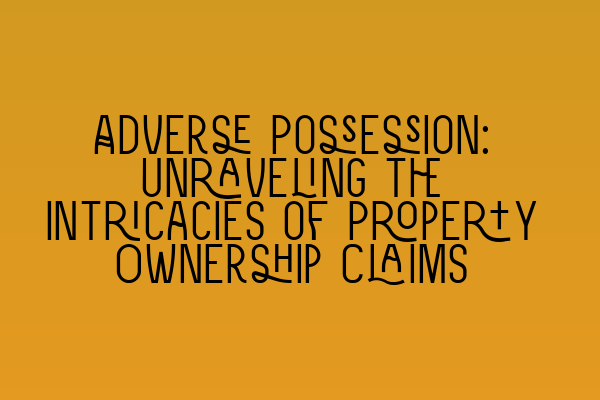Adverse Possession: Unraveling the Intricacies of Property Ownership Claims
At SQE Property Law & Land Law, we understand that property ownership disputes can be complex and contentious. One area of property law that often sparks heated debates is adverse possession. In this blog post, we will delve into the intricacies of adverse possession, shedding light on the key aspects of property ownership claims.
What is Adverse Possession?
Adverse possession refers to the legal doctrine that allows an individual to acquire ownership of a property by occupying and using it openly, continuously, and without the permission of the legal owner. In other words, if someone takes possession of a property and treats it as their own for a specified period, they may be able to claim legal ownership of the property. However, it is crucial to note that adverse possession laws vary from jurisdiction to jurisdiction, and the specific requirements and timelines may differ.
Understanding the Requirements for Adverse Possession
To establish a successful adverse possession claim, certain requirements typically need to be met. While the exact criteria may differ depending on the jurisdiction, some common elements include:
1. Actual Possession: The claimant must physically occupy the property, treating it as their own. Mere casual or sporadic use of the property is usually insufficient to satisfy the requirement.
2. Open and Notorious Possession: The claimant’s possession of the property must be visible and apparent to any reasonable observer. The occupation should not be concealed or secretive.
3. Exclusive Possession: The claimant must possess the property exclusively, without sharing possession with the legal owner or anyone else.
4. Continuous Possession: The claimant must maintain continuous possession of the property throughout the statutory period. Any temporary vacancies or interruptions may reset the clock on the adverse possession claim.
5. Hostile Possession: “Hostile” does not necessarily imply ill-intent. In this context, it means possessing the property without the owner’s permission. The claimant must demonstrate that they are using the property as their own and not as an invited guest.
6. Statutory Period: Adverse possession claims must usually meet a prescribed statutory period, which can range from several years to several decades. The length of the statutory period depends on the jurisdiction and the nature of the property.
Adverse Possession in Practice: Real Case Examples
To help illustrate the complexities of adverse possession, let’s consider a couple of real-case examples:
1. Example 1: Empty Lot
In a small town, Mr. Smith has been using an empty lot adjacent to his property as additional garden space for over 20 years. He diligently maintains the lot, adding a fence and regularly cultivating the land. However, the legal owner, Miss Johnson, never objected or attempted to reclaim the lot during this period.
2. Example 2: Abandoned Barn
In a rural area, Ms. Jones discovers an abandoned barn on her property that has been in disrepair for many years. She decides to renovate the barn and use it as a workshop. Ms. Jones puts in significant time, effort, and resources to restore the structure, making it usable again. The legal owner, Mr. Brown, who inherited the property but lives in another state, never knew about the barn’s existence.
In both examples, the occupiers may have plausible claims for adverse possession due to their open, continuous, and exclusive use of the properties over a substantial period without objection from the legal owners. However, it is essential to consult with a qualified property law solicitor to understand the specific laws and requirements in your jurisdiction.
Navigating the Adverse Possession Process
If you believe you may have a valid adverse possession claim, it is crucial to follow the appropriate legal procedures to ensure your rights are protected. Consulting with a knowledgeable solicitor who specializes in property law is highly recommended. They can provide guidance on the specific laws in your jurisdiction, help gather the necessary evidence, and assist in preparing your claim.
At SQE Property Law & Land Law, our team of dedicated solicitors has extensive experience in handling adverse possession cases. We can offer expert guidance and advocacy throughout the process, helping you understand your rights and maximize your chances of a successful outcome.
Are you preparing for the SQE exams? Check out our related articles to help you in your preparations:
– SQE 1 Practice Exam Questions
– SQE 1 Practice Mocks FLK1 FLK2
– SQE 2 Preparation Courses
– SQE 1 Preparation Courses
– SRA SQE Exam Dates
In Conclusion
Adverse possession can be a complex legal concept with various requirements and nuances. Whether you are in the midst of a property ownership dispute or aiming to understand your rights in adverse possession claims, seeking professional legal guidance is essential. Our team at SQE Property Law & Land Law is ready to assist you in navigating the intricate world of property law and ensuring that your rights are protected. Contact us today to schedule a consultation and discuss your case.
